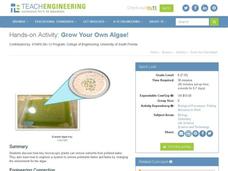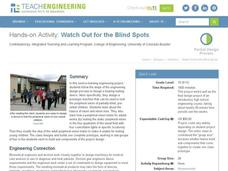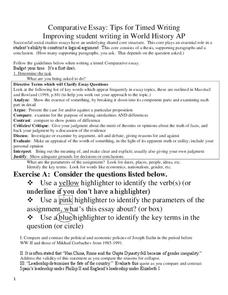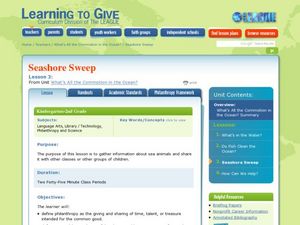Exploratorium
Falling Feather
Whether or not Galileo actually dropped balls from the Leaning Tower of Pisa, this demonstration will solidly demonstrate that objects are accelerated at the same rate, regardless of mass. You will, however, need a vacuum pump and a few...
Curated OER
Oxidation: Does Iron Burn?
Searching for a fairly easy demonstration of how oxidation triggers rust formation? The demonstration allows high school chemists to witness the rusting of metals, as large and small objects are held into a flame while triggering the...
Teach Engineering
Ramp and Review (for High School)
Rolling for momentum. As part of a study of mechanical energy, momentum, and friction, class members experiment rolling a ball down an incline and having it collide with a cup. Groups take multiple measurements and perform several...
Center for Learning in Action
Investigating Physical and Chemical Changes
Super scientists visit ten stations to predict, observe, and draw conclusions about the physical and chemical changes that occur when different states of matter—liquid, solid, and gas—are placed under a variety of conditions. To...
EngageNY
The Definition of a Parabola
Put together the pieces and model a parabola. Learners work through several examples to develop an understanding of a parabola graphically and algebraically.
Teach Engineering
Concentrated Solar Power
The seventh segment in an eight-part unit promotes the idea of concentrating the sun to increase the power of a photovoltaic panel. Pupils learn about devices used such as reflectors or lenses.
College Board
AP® Computer Science: A Picture Lab Student Guide
How do you modify digital pictures? In this lab learners write methods that modify digital pictures. They how to traverse a two-dimensional array of integers or objects, and are introduced to nested loops, binary numbers, interfaces, and...
Teach Engineering
Grow Your Own Algae!
Develop a model of a wastewater treatment center. The last activity of the unit has pupils mix a lake water sample into a tank of water containing fertilizers. Over time, the algae from the lake water grows and removes the nutrient-rich...
Teach Engineering
Watch Out for the Blind Spots
Applying engineering concepts to the field of medicine, pupils design a device to help test peripheral sight. The class learns and follows a specific design process for engineers before separating into groups; each group builds a...
EngageNY
The Opposite of a Number
It's opposite day! The fourth installment of a 21-part module teaches scholars about opposites of integers and of zero. Number lines and real-world situations provide an entry point to this topic.
Wyatt Bingham
Comparative Essay: Tips for Timed Writing
This site provides a guideline for writing a comparative essay for the AP World History Test. It also provides practice exercises and samples.
Polar Trec
Ozone Data Comparison over the South Pole
Did you know the hole in the ozone is seasonal and filled by January every year? The lesson uses scientific measurements of the ozone over the South Pole to understand patterns. Scholars learn that the hole grew bigger annually before...
DiscoverE
Hidden Alarm
It's time to wake up! Young engineers build an electric circuit that will activate an alarm. The use of switches in the circuit is a must—because you don't want the alarm to keep beeping forever!
DiscoverE
Oranges and Batteries
Orange you glad you can make circuits using fruit? Young electricians learn about electric circuits and electricity. As part of the lesson, they build a circuit with an orange and then with a banana.
National Research Center for Career and Technical Education
Lou-Vee-Air Car
Who said teaching a STEM lesson had to be challenging? Incorporate a career and technology-centered car build into your upcoming force lesson plan, and your class will be moving down the road in no time! Pupils practice...
Space Awareness
Fizzy Balloons - C02 in School
Carbon dioxide is a very important gas; it is present in the air, used in cooking, and supports plant and animal life. Scholars investigate the properties of carbon dioxide with three different activities. They experience a color change,...
Curated OER
Energy Conversion
Sixth graders study energy conversions. They watch a demonstration of a working engine and make a chart explaining the energy conversions taking place. They build a simple electric motor and research other types of electric generators.
Curated OER
Do You See What I See?
Students identify the characteristics of different painting styles in this activity. They examine the essential elements that characterize the different styles, and further research one chosen style of artwork. They then create an...
Curated OER
Seashore Sweep
Students gather information about sea animals. In this ocean lesson plan, students read a story about the ocean and seashore. They discuss the needs of seashore animals and create a Mystery Ocean Animal riddle book. Students also...
Curated OER
Value and Intensity Painting
Students create different values and intensities of color. They choose a hue and paint the complementary color circle. They create a tint and a shade from the original hue. They complete the Gradations of Intensity worksheet to...
Curated OER
Ethics Search Project
Students question, imagine, and investigate certain scientific environmental issues. They organize their data and present a PowerPoint presentation. They include include a complete analysis of St Ignatius commitments and ideas.
Curated OER
Metals, Nonmetals, Metalloids
Students recognize that metals, nonmetals, and metalloids have common attributes. They Identify physical and chemical properties. Students define ores and identify where ores can be found.
Curated OER
Reactions of Group 1 Metals With Water
In this elements worksheet, students complete a graphic organizer comparing observations of lithium, sodium, and potassium. Then students determine how these elements react with water. Students complete 3 fill in the blank questions.
Curated OER
Parts of speech and "grammar rock": English
Sixth graders use the video of "Grammar Rock", class discussion, worksheets and group work to explore grammar and parts of speech. They produce a film strip displaying their understanding of parts of speech in English.

























